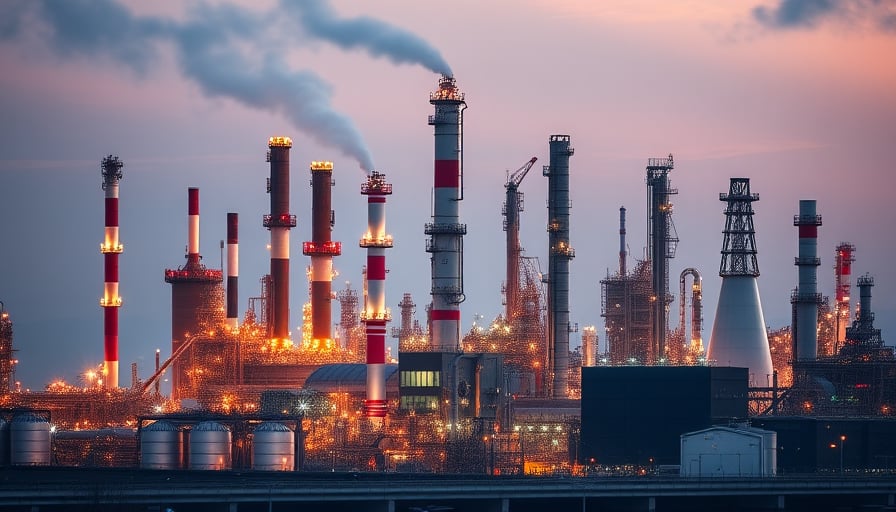Recent Developments Impacting Rosneft Oil Co PJSC
Rosneft Oil Co PJSC, the largest oil producer in Russia and a key player on the Moscow Stock Exchange, has faced a confluence of geopolitical and operational shocks in the past week. The company’s market valuation, currently at 4 010 000 000 000 RUB with a closing price of 424.3 RUB on 18 October 2025, sits below its 52‑week low of 395 RUB and well outside the 52‑week high of 606.05 RUB set in late 2024. Its price‑to‑earnings ratio of 2.2 reflects the pressure on earnings amid tightening sanctions and supply‑chain disruptions.
1. Expanded U.S. Sanctions on Rosneft
On 22 October 2025, the United States formally imposed sanctions on Russia’s principal oil producers, Rosneft and Lukoil. The move, described by the U.S. administration as “the most consequential sanction package to date,” was aimed at curbing President Vladimir Putin’s war financing in Ukraine. The sanctions bar U.S. entities from any transactions involving the two firms, and extend to their subsidiaries and joint ventures abroad. For Rosneft, this translates into immediate constraints on financing, access to U.S. capital markets, and the ability to engage with U.S.‑based technology suppliers.
2. United Kingdom Exemption for German Subsidiaries
While the U.K. widened its sanctions list on 15 October, it issued a special licence on 22 October granting limited access to two German subsidiaries of Rosneft that are under German state control. The exemption is intended to mitigate the economic fallout for businesses that rely on these subsidiaries for equipment and services, yet it underscores the fragmented nature of the sanctions regime. The licence does not apply to Rosneft’s core Russian operations, leaving the company’s domestic portfolio largely unaffected by this narrow window.
3. European Union’s 19th Sanctions Package
The European Union’s latest package, announced on 22 October, focuses on Chinese entities that facilitate the circumvention of Western restrictions on Russia’s oil sector. Two Chinese refineries, a trading firm, and an additional non‑oil entity were named. While Rosneft itself is not directly listed, the sanctions signal the EU’s intent to sever any indirect financial lifelines that could aid the Kremlin’s energy revenues. The EU’s approach reflects a broader strategy of leveraging global supply chains to enforce compliance with international norms.
4. Operational Shock: Drone Attack on Novokuibyshevsk Refinery
In the Volga region, Rosneft‑controlled Novokuibyshevsk refinery halted primary crude processing after a drone strike on 20 October. The incident—Russia’s second significant drone attack on a refinery in recent months—disrupted the company’s refining throughput and raised concerns about the resilience of its infrastructure against active conflict. While the refinery’s closure is temporary, the event adds to the cumulative operational risk facing Rosneft’s downstream assets.
5. Market Sentiment and Oil Prices
Oil prices slipped on 21 October due to oversupply concerns and escalating U.S.–China trade tensions. Rosneft’s exposure to U.S. sanctions has likely amplified market anxiety over the firm’s ability to deliver and finance shipments, further pressuring its valuation. The IEA’s bearish outlook on demand, combined with geopolitical instability in Russia and India, suggests that Rosneft’s export volumes may experience additional volatility as buyers navigate the tightening sanctions environment.
6. Strategic Implications for Rosneft
- Financing and Asset Valuation: The U.S. sanctions sever ties to U.S. financial institutions, potentially forcing Rosneft to seek alternative financing structures. The company’s market cap may face downward pressure as investors reassess risk.
- Supply Chain Adaptation: With key U.S. and EU partners restricted, Rosneft will need to accelerate diversification of its supplier base, particularly in technology and equipment.
- Risk Management: The drone attack underscores the necessity of robust security protocols for critical infrastructure. Rosneft’s risk‑management framework will likely incorporate enhanced cyber‑physical safeguards.
- Regulatory Compliance: The U.K. licence for German subsidiaries illustrates the need for nuanced compliance strategies that balance operational continuity with adherence to evolving sanctions regimes.
7. Forward View
Rosneft’s trajectory will hinge on its ability to navigate the tightening web of international sanctions while maintaining operational stability amid regional conflict. The company’s valuation, currently trailing its historical high, may experience a recalibration as market participants weigh the compounded risks of regulatory restrictions, infrastructure vulnerabilities, and geopolitical uncertainty. Investors and stakeholders should monitor the unfolding U.S. and EU policy developments, the resilience of Rosneft’s supply chain, and the company’s strategic responses to safeguard its long‑term value proposition.
